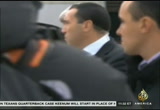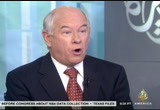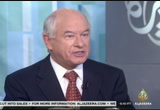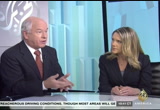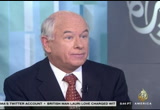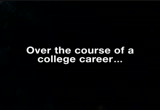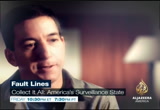tv Inside Story Al Jazeera October 29, 2013 11:30am-12:01pm EDT
11:30 am
go to our website and check us out, aljazeera.com. is this the new business or usual or is it damaging american foreign policy. plus the influence of rock legend lou reed and his impact on the culture from the 60s to today. >> hello, i'm libby casey. tonight on inside story we'll take a walk on the wild side and look at the life and legacy of iconic rocker lou reed who died at the age of 71. first we'll focus on american spying, specifically spying on friends, and our friends are not happy. tonight you can add spain to the
11:31 am
list of countries that are demanding answers. the newest details emerge in this spanish newspaper "el mundo" reporting that phone calls from surveye surveilled. over the weekend came news that the nsa has been monitoring calls from german chancellor angela merkel as far back a as 2002. >> i think the most important thing is to find a basis for the future on which we can operate, and as i said today trust needs to be rebuilt which implies that trust has been severely shaken, and the members of the european union share these concerns today. true change is necessary. >> reporter: when barack obama was running for president
11:32 am
in 2008 he went to german and pledged a new era of unity. >> people of the world look at berlin. where a wall came down, a continent came together, and history proffered that there is no challenge too great for a world that stands as one. >> reporter: and as america's top diplomat landed in france last week the newspaper la monde reported that the nsa had monitored communications there. john kerry was on tour to discuss the syrian crisis when he was summoned to answer some questions. >> these kinds of practices between partners that violate privacy are totally unacceptable. we must quickly assure that these practices aren't repeated. >> reporter: united in anger last week 28 heads of the european union countries gathered for what was supposed
11:33 am
to be a discussion about the growing syrian refugee crisis. france and germany announced bilateral talks with the u.s. over the goal of dispute of electronic surveillance at the end of the year. once again at the center of a wiretapping supervisor is former nsa contractor edward snowdon. but this is not the first time that snowdon has leaked classified information about tapping ally communications. just la month brazil's president postponed a state visit to the u.s. over revelations that the nsa has spied on her. but house committee chairman mike rogers said our european allies should be thankful for keeping them secure from outside threats. >> if th their citizens knew what it was about they would be popping the shame cork. it keeps
11:34 am
the french safe, and it keeps our allies safe. >> reporter: the question is how will this play out to allies across the atlantic and around the world. >> joining us to discuss nsa spying and u.s. diplomat is are p.j. crowley former isn't secretary of state now professor of the george washington university school of public affairs. and correspondent for the wall street journey. how shocking are these revelations. we'll start with angela merkel, head of state. >> it's different from eavesdropping on the citizens of the nation because it's a very targeted sort of the surveillance. obviously if you're spying on a particular leader you're trying to figure out what is the decision-making process going on for that particular leader, and you have probably fairly specific things that you're looking for. if you're looking at the broader citizenry you're probably
11:35 am
looking for behaviors or communication that seem out of the order or key that there is a threat under way. >> the allegation s go to 2002. >> well, 2002 might be significant in that the united states was focused on the upcoming invasion of iraq. there was a great debate within the security council, and for the united states trying to figure out would it get the vote in the counsel, would it have the u.n. backing and legitimacy. so you were trying in that context to remember what all the members who would influence the security council were thinking, what they would be likely to do when the case was presented. >> and a vocal supporter of president bush at the time were they looking at the process and you can't help but over things like economy, strategy. >> some things come up in particular that friends don't
11:36 am
spy on friends. use of intelligence is about understanding the world, and things that might happen in another country that would profoundly effect your own. if i'm a senior european official i might want to know what is going on in greece. the future of the european union as europeans know it depends on whether greece follows its austerity plan. the leaders will tell you that but not necessarily all. think about what has happened in the united states over the past 30 days. the whole debt crisis and many european leaders or other world leaders is saying is the united states going to drive over the fiscal cliff and take the global economy with it? i really do suspect in washington there are a lot of washington activities trying to answer that question. >> how surprising is this in terms of the u.s. trying to gain intel from their friends? >> it's not terribly surprising. the french are broadly known to spy on american interests, as
11:37 am
are the germans. surely the chinese, russians and israelis have an active spying presence against the united states. a lot of it is even if you're not trying to learn criticalcally new things from a particular leader sometimes you just want to verify that the things they're telling you in meetings, discussions or saying publicly is what they're saying to their own staff. >> so we're also hearing about these huge data watched, 60 million phone calls monitored. how can you comb through that information. >> what is unclear from the documents we've seen in terms of the phone call collection and france and i would believe you're proking seeing a similar thing in spain. it may be just that that's just phone call data. records that show somebody calling somebody else at a particular time for a particular length of time.
11:38 am
>> different than eavesdropping. >> different from eavesdropping because you're not listening to the actual conference. there is undoubtedly some of that going on as well, but at the volumes that we're see going to you're talking about 60 million to 70 million a month it seems more likely that what they're talking about there is some data. and the documents that have come out so far have been a little bit unclear, and the government hasn't sought to really explain it except they did say that specifically with respect to the french reports last week that the reports were incorrect, and those reports had really focused on interception of phone call conversations which makes me think that we're talking about data. >> how are you doing reporting on this? how are you getting access to the information that is coming from he had car edward snowdon. >> well, the documents are he is to get once they post them online. the snowdon revelation has shaken the trees a little bit and has led other people to talk about other elements of the spying apparatus that they're
11:39 am
aware of that raise other types of policy ncerns. we did some reporting looking at nsa tapping into the u.s. internet backbone, which had not been a highlight of the edward snowden documents but shows how america is using the information to collect foreign information. >> p.j. crowley, european leaders are expressing outrage. how much of that is legitimate ? how many of them had known that this is happening? >> well, there is an intelligence issue, and beneath the surface there is a deep relationship among intelligence that sve american interests as well as european interests, a lot of cooperation and information sharing, which is why there has been progress in combating terrorism.
11:40 am
we're in a better position than, say, 12 years ago. the united states has been through this before with wikileaks. you had 250,000 state department documents, many classified cables. you've got awkward conversations. how could european leaders say how could you call me vain. but obviously at the end of the day interest drive relationships but politics makes relationships. you're seeing steps being taken politically to try to manage this, and stabilize the situation. it will obviously take some ti time. >> mike rogers, chairman of the intelligence committee on capitol hill. he's saying this keeps everyone safer. what is your response to that? >> well, i think there is probably some truth to that. there are a lot of terrorist plots that the u.s. officials
11:41 am
have pointed to that have been thwarted they claim, which are in europe as well as in the u.s. the claim from the u.s. government is that the information that nsa is collecting particularly as it has to do with counter terrorism is benefiting a broader swath than just the united states. >> but there is a substantive difference here. it's not all politics. european and americans look at privacy a different way. they probably look at security and how you draw that line between privacy and security a different way. that is going to be debated. it's already being discussed among nations and there will be adjustments made as this process goes forward. >> talk to us about tiers of allies and relationships. there is a group of five is, great britain, the u.s. canada , new zealand, australia. how is the treatment of those
11:42 am
country different than germany, france, and what is happening in spain. >> well, that's under view. the so-called five-is there is sort of a in spying agreement. since the revelations from edward snowden, the white house initiated an interagency review when they discovered that there was all this monitoring of european leaders and others. and they put a stop to some of it, we're told, including chancellor merkel at the time and we're told they're looking at another set of those leaders that they may--that they're going to try to stop monitoring as well. so that's--it's something that the u.s. is revaulting. but there is no agreement per se between the u.s. and germany that they're not going to spy on each other. >> part that have is simply because over time the no-spying is based on a commitment to share everything, and these are countries where there is a broad
11:43 am
understanding that our interests intersect and merge and overlap to a very significant level. if france or germany or other countries want the same understanding, that can be negotiated but there are political and strategic implications. >> who is watching the watchers? the nsa is collecting all of this data. revelations coming out with the snowden revelations. >> it's getting more scrutiny than it did before. what is interesting is it wasn't until the white house launched this interagency review that they started figuring out what was going on. there has been this call for nsa transparency but probably the first place they should start with transparency should be within the government a little bit. what has been interesting, the revelation versus led to more transparency, but some of that has been forcing the government
11:44 am
to also put out more information far beyond what mr. snowden has put out. >> in crawlly, you served in the state department is it possible that the white house didn't necessarily know what the nsa is doing with their collecting and whether or not they're spying on world leaders? >> it's absolutely like i he didn't know. the president said he didn't know. the president provides strategic guidance but the tactical decisions of how you go about getting the information that leaders know, that's done at lower levels. it's a good question of how much knowledge there was within the white house, but i don't think this is the kind of decision that you're going to bring into the oval office. >> thank you so much for talking with us. we'll take a break. when we come back we'll change topics and talk about life and legacy of rock-n-roll famer lou reed, who passed away at the age
11:45 am
>> while you were asleep, news was happening. >> here are the stories we're following. >> find out what happened and what to expect. >> international outrage. >> a day of political posturing. >> every morning from 6 to 10am al jazeera america brings you more us and global news than any other american news channel. >> tell us exactly what is behind this story. >> from more sources around the world. >> the situation has intensified here at the boarder. >> start every morning, every day, 6am to 10 eastern with al jazeera america.
11:46 am
11:47 am
>> al jazeera america's social media community, on tv and online. >> this is your outlet for those conversations. >> post, upload and interact. >> every night share undiscovered stories. >> welcome back to "inside story." tonight we're remembering the rock legend lou reed. perhaps no other artist so thoroughly embraced his darker shades with songs about dog abuse, and seedy side of life in new york city and turned it into something a generation of rockers to follow. >> reporter: lou reed leader of the band velvet underground passed away after suffering ailments of a liver transplant earlier this year. he was 71. north worthy for songs such as "he
11:48 am
heroin" and "sweet jane." although the band never achieved commercial success reed sprang to worldwide fame . he credited much of his success to artist andy warhol. >> everything that i do from the outside. if it hadn't been for andy, who knows whether we would have had a chance to do anything. so i think i owe everything to mr. warhol. >> reporter: although the velvet underground enjoyed an alternative cult following reed launched a solo career in 1972. his first release was "walk on the wide side." [♪ singing ] >> reporter: his solo work continued for more than three decades including a show at the white house in 1998. [applause]
11:49 am
reed was inducted into the rock-n-roll hall of fame as part of the velvet underground in 1996. despite getting sober in the 1980s decades of hard drinking and drug abuse took its toll. he underwent a liver transplant in april. he's survived by his third wife, musician laurie anderson. joining us to discuss lou reed and his lasting influence is david markaze and ryan mitchell. thank you both of you for being here. ryan, you were a 15-year-old punk rocker covering songsly lou reed, covering songs by the velvet underground. what is the appeal? you're 40 years younger than he is. you're hearing music like "sweet
11:50 am
jane," and he's talking about listening to the new york station late at night and trying to get to new music something really avant-garde and growing up in the suburbs and being around everything that you're sick off. you think, i live in a boring world, and in this old time new york you have lou reed making these songs about drug use, privates or transvestites. things that would still be pushing it today. i think as a 15-year-old kid playing punk music it struck a cord with everybody. okay, yeah, i'm mad at the boring old world out there, too. >> reporter: david, he was credited with influencing a whole new generation of rockers including ryan in our studio, was really influenced by that. what is it about his music that has done that? >> i think love of it was based on what ryan just said. there is a feeling that with lou
11:51 am
reed's music he's introducing you to these ways of living which is beyond normal existence and he's pulling back the curtain on the seedier side of life and telling you about people and experiences that you wouldn't normally come across especially in rock or pop music. the thing that we really don't want to overlook when we're talking about lou reed is that the music is well crafted. like ryan said, the melodies are amazing, the chord progressions and he has the esthetic message wrapped up in this compelling sound. >> more with these guests in a moment. stay with us, this is inside all next week america tonight investigates the campus rape crisis. >> serial rape is the norm on college campuses. >> i know that when i did
11:52 am
11:54 am
(vo) friday night ... >> does the nsa collect any type of data on millions of americans? >> no sir. (vo) fault lines investigates what it's like to live under the watchful eye of the nsa. >> they know everything that you do, everything that you think, everything that you fear. they know how to manipulate and control you. the state has all the power. >> we have done more to destroy our way of life than the terrorists could ever have done.
11:55 am
>> welcome back to inside story. we're talking about lou reed and the lasting impressions of his music. with us, david marchese from spin magazine of new york, and ryan mitchell here in d.c member of the band shark week. lou reed talks about this version of new york that seedy, it's seamy, intense, does it still exist today? >> if it does, i don't know where it is. i think that's part of the appeal of why--part of why lou reed's music is going to last for a long time. sort of no matter when he was writing, if it was in the late 60's or 70's, it was giving you a picture of new york to those listening to his music. and the luridness and the details made it seductive. as time went by the things that he was seeing in new york that
11:56 am
he was singing about, it's further and further away from reality. it's a nostalgic longing of something we'll never experience. >> is it nostalgic to talk about seamy new york city. >> it probably wasn't all that glorious to live in. we're adding a golden age lens to t but i'm sure its true for david or myself or for a lot of people. lou reed tells a story about migration to new york to take a walk on the wild side. it's the story of move to go new york, to live a dream, living in a seedy world, performing seedy acts, whatever it is. it's the story we're all doing or a lot of musicians, a lot of artists in brooklyn are trying to live that. i doubt it's really as rugged or dark as it was then, but it's kind of--this nostalgia that we're looking for. >> you mentioned in the late
11:57 am
60's and early 70's people think of peace and love. this is counter to the current counter culture. >> that's exactly right. that's where a lot of appeal lies. more now than back then, the underground with lou reed's music, it was never wildly popular but there are people who the peace-love doesn't really resonate, and with someone like lou reed he's showing you the harder aspects of life and the alienation and dissatisfaction that is attractive and romance. there is a romance to those feelings of alienation particularly in rock music. you see that filtered to punk and indie rock today where it seems a lot more of it is influenced to the things and attitudes of lou reed rather than beatles. >> as you watched his career as
11:58 am
he went from the velvet underground to being a solo artist to being involved with artistic process, reviewing other artists did he stay influential? >> if we're talking about lou reed's influence, we're probably talking about the first decade of his recording career 1967 to the middle of the 70's. one thing that is interesting about his legacy as he got older into his 40s and deep center middle age he found ways to be provocative and to challenge his audience and to challenge himself. his last album a couple of years ago was lulu with metallica, an incredibly abrasive album based on a german play from the 1901900's, even as he got olderd
11:59 am
the idea that people are to age graceful,ly i don't think he wanted to age gracefully, and the terms of how to age as a rock musician will get stronger, but it will take time to get there. >> sure, i think you see his influences through the 90's , the 80's, and you see his guitar work on metal music, and you see stuff like " juno" taking some of his pop acoustic hits from the 60's, and you're seeing a lot of influences in so many spectrums of music. >> gentlemen thank you so much. that's all we have time for today. that's it from the team in washington, d.c. and from me, libby casey. thank you for watching. good night.
12:00 pm
welcome to al jazeera america, i'm del walters. >> i want to apologize to you that the website has not worked as well as out should. >> congress demands from this woman about the affordable care website. and two florida mothers taking on the stand your ground law in florida. congress wants answers about the troubled rollout of the
185 Views
Uploaded by TV Archive on

 Live Music Archive
Live Music Archive Librivox Free Audio
Librivox Free Audio Metropolitan Museum
Metropolitan Museum Cleveland Museum of Art
Cleveland Museum of Art Internet Arcade
Internet Arcade Console Living Room
Console Living Room Open Library
Open Library American Libraries
American Libraries TV News
TV News Understanding 9/11
Understanding 9/11


